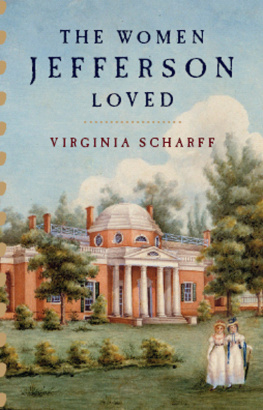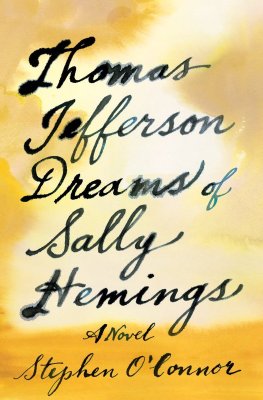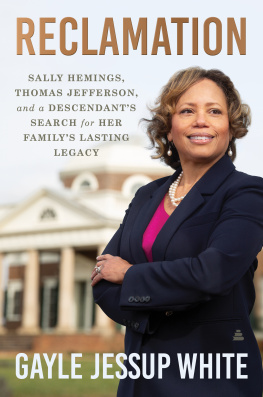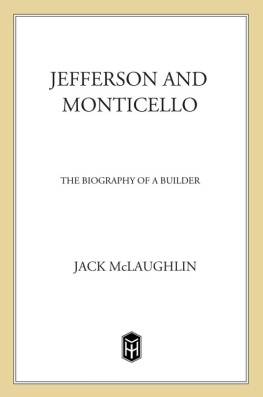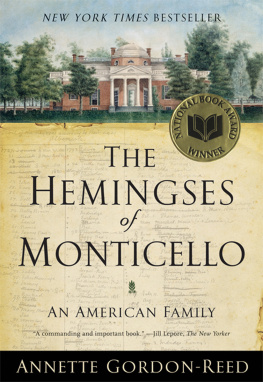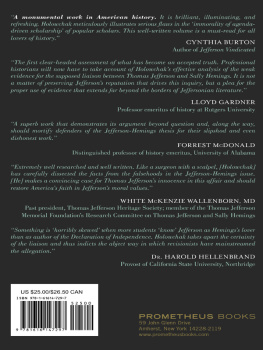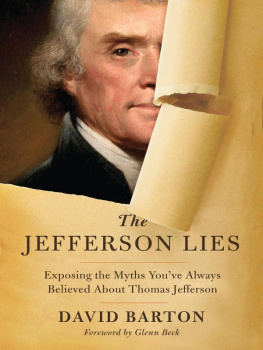TO
CHRIS
who understands the claims of the head and the heart
Nobody cares for him who cares for nobody.
THOMAS JEFFERSON, 1786
Contents

IN THIS BOOK, at the risk of appearing to lack respect for my subjects, I will often refer to people by their first names and even by nicknames, rather than by their full names or last names. I do so to avoid confusion among relatives with names so bewilderingly similar that even the most dogged reader would be flattened by the effort of trying to make sense of all the Janes and Marthas and Marys, Jeffersons and Randolphs, Johns and Thomases. I hope that by referring to Sarah Hemings as Sally and to Martha Jefferson Randolph as Patsy, I enable my readers to keep these women in plain sight. I refer to Martha Wayles Skelton Jefferson, Thomas Jeffersons wife, by her formal first name, and not her nickname (which was Patty), in order to avoid confusion between her and her long-lived daughter, Patsy Jefferson Randolph. For consistency, I also use the spelling Hemings for all members of the Hemings family, though some members (notably, John Hemings and Betsy Hemings) spelled their surname with two m s.
Anyone who enters the world of Thomas Jefferson must also grapple with the problem of genealogy. Americans current enthusiasm for the subject reflects our history as a nation of immigrants, a fascination with finding out from whom, and from where, we came. That passion is particularly deep-rooted in Virginia, where a cult of founding families has produced the acronym FFV, shorthand for First Families of Virginia, a three-letter soubriquet that packs a gigantic load of meaning. But genealogies, which seem to mark the orderly procession of births and marriages, the cementing of harmonious ties, hide as much complexity and conflict as they reveal. The Randolph family, for example, one of the most storied of the FFVs, has a genealogy that one wag said resembled a tangle of fish hooks. Thomas Jefferson knew from decades of experience that genealogy was no guarantee of virtue, wisdom, loyalty, or even sanity.
Genealogies also tend to be stultifyingly repetitive and confusing, none more so than those of the Virginia families who appear here. But they are also indispensable to histories of people related by blood. I want to show the ways in which the Wayles, Hemings, Jefferson, and Eppes families came together and shadowed one another through three generations. So that readers may know the players, I offer a program, a family tree in the front, and a Dramatis Personae at the back of this book. Unlike most genealogical charts, this one includes lines that cross, which some readers may find puzzling, or even troubling. That is probably as it should be.
CORNELIA JEFFERSON RANDOLPH, a spinster at twenty-seven, contemplated her familys ruin with more optimism than she had any right to feel. Her dear grandfather, Thomas Jefferson, had died five months before, on the fiftieth anniversary of his Declaration of Independence. His passing had left Cornelias mother, Martha Jefferson Randolph, homeless, destitute, depressed, and exhausted. The family was making do as best it could, crowded together in makeshift households, scrimping on coffee and sugar and firewood, depending mostly on Cornelias harried brother, Thomas Jefferson Randolph, to house them and feed them and fend off the creditors and the scavengers.
On that dreary December day of the hardest Virginia winter she had ever known, Cornelia wrote to her sister Ellen, who had escaped the worst by marrying a Yankee and moving to Boston. Cornelia confided that she hated dependance particularly dependance on brother Jeff. Noble as he was, Jeff annoyed his sisters Cornelia, Mary, and Virginia with his nagging and penny-pinching, his second-guessing of their housekeeping, his aversion to music. Cornelia was determined to find her way to independence, inspired by her grandfathers example. We are his children, she declared, and the energy he has shewn in public affairs, is in our blood & we will shew it in our private affairs. we will never despair, we will never be cast down by difficulties, we will bear ourselves bravely & be cheerful in the midst of misfortunes, & if we are thrown upon our own resources we will find them in ourselves. Cornelia had seen her grandfathers perseverance. When his crippled right hand hurt too much to go on, he picked up the pen and wrote with the left.
At that very trying moment, Cornelia Randolph felt particularly close to Thomas Jefferson. She was immersed in copying his papers, perhaps the most precious thing he had left behind. Priceless as they were to his family, they were also a badly needed financial asset, soon to be sold to the Library of Congress, that great institution her grandfather had founded. Jeff Randolph served as official executor of the papers, but his sisters had the job of making legible copies of the manuscripts. As they scratched away with frozen fingers, huddled close to a meager fire, they may also have carried on another family tradition: feeding the flames with anything that felt too private or caused too much pain, anything that could not be comfortably explained or ignored.
Nearly all his adult life, Thomas Jefferson had methodically filed the letters he received, and made his own copies of the ones he wrote. But many of those letters have never been found. Like the twinned black inkblots in a Rorschach test, the missing letters sometimes form meaningful patterns, hinting at a suggestive shadow literature of their own, a record of the things Jefferson and his descendants did not care to pass down to posterity. Jefferson himself, and his daughters and granddaughters as well, sometimes ended personal letters by urging the recipient to throw this in the fire. The burning was as creative as it was destructive. Just as Thomas Jeffersons slaves burned bricks to construct the walls of his magnificent house, he and his descendants burned letters to construct an imaginary but seemingly impenetrable wall between his public legacy and his private life.
As much pulling down and putting up went into fashioning Thomas Jeffersons correspondence for public consumption as there was in the many makings of Monticello. The voluminous corpus that remains for public perusal seems a complete collection, just as the mansion we see today appears a timeless masterpiece. But both were products of changing times and close editing, artifacts of careful storytelling, history handmade by Thomas Jefferson, his loving family, his preservers and defenders.
THOMAS JEFFERSON MEANT to make his own history. But he could not do so just as he pleased. Even as he worked to preserve the wall between his public and private lives, he insisted that everything he did and said and worked for in public, all the remarkable achievements that have made him the most beloved and vexing of the Founding Fathers, he did out of love for his family and home. His love for those closest to him, and the sacred bonds of affection, inspired his immortal embrace of life, liberty, and the pursuit of happiness. No wonder the American public has been fascinated with his private life. We agree with James Parton, the Jefferson biographer who wrote in 1874, If Jefferson was wrong, America is wrong. We see in him Americas greatness and meanness, its generosity and arrogant possessiveness, its good intentions and bad habits, its magnificent achievements and tragic shortcomings. We want to know what made him tick, to see the beating heart of him.
What Jefferson tried hardest to hide, we suspect holds the key. As it turns out, his most closely guarded secrets, most fiercely maintained silences, nearly all had to do with the women he loved. This book is about those women, about what love meant to him and to them, and about what it cost them all. Their ways of loving were different from ours, but love was a powerful force in their lives, nonetheless. We see proof of the power of love in scores of carefully preserved, fascinating letters, exchanged among Jefferson and his daughters and granddaughters. But some of the women Jefferson loved most are hardest to know.
Next page
